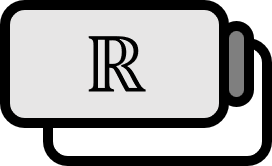Integrability is Preserved in the Composition with Continuous Functions
This document is based on the Riemann-Stieltjes Integral. If we set it as $\alpha=\alpha (x)=x$, it equals the Riemann Integral.
Theorem1
Suppose that the function $f$ is Riemann(-Stieltjes) integrable on the interval $[a,b]$ and let $m \le f \le M$. Let $\phi$ be a function that is continuous on the interval $[m,M]$. Let the function $h$ be defined as $h=\phi \circ f$. Then, $h$ is Riemann(-Stieltjes) integrable on the interval $[a,b]$.
Proof
Let any positive number $\varepsilon>0$ be given. Since $[m,M]$ is compact (as it is closed and bounded), and a continuous function on a compact set is uniformly continuous, $\phi$ is uniformly continuous. Therefore, by the definition of uniform continuity, there exists $\delta < \varepsilon$ such that the following holds:
$$ \begin{equation} |s-t| < \delta \implies |\phi (s) - \phi (t) | < \varepsilon \quad \forall s,t \in [m,M] \end{equation} $$
And since $f$ is integrable, by the necessary and sufficient condition, there exists a partition $P$ that satisfies the following:
$$ \begin{equation} U(P,f,\alpha) - L(P,f,\alpha) < \delta^2 \end{equation} $$
Now, let us set the following.
$$ {M_{i}}^{f}=\sup f (x) \quad \text{and} \quad {m_{i}}^{f}=\inf f (x)\quad (x_{i-1} \le x \le x_{i} ) \\ {M_{i}}^{\phi}=\sup \phi (x) \quad \text{and} \quad {m_{i}}^{\phi}=\inf \phi (x)\quad (x_{i-1} \le x \le x_{i} ) $$
Now, classify the index $i=1,2,\cdots,n$ into two groups according to the following rule.
$$ \begin{equation} \begin{cases} i \in A, &\mathrm{if}\ M_{i}^{f} -m_{i}^{f} <\delta \\ i \in B, &\mathrm{if}\ M_{i}^{f} -m_{i}^{f} \ge\delta \end{cases} \end{equation} $$
Then, for $i \in A$, it follows from $(1)$ that ${M_{i}}^{\phi} -{m_{i}}^{\phi} < \varepsilon$.
For $i \in B$, we can consider $K$ that satisfies the following equation:
$$ \begin{equation} {\color{green} {M_{i}}^{\phi} -{m_{i}}^{\phi} } \le {\color{blue} 2K} (K=\sup |\phi (t)|, m \le t \le M) \end{equation} $$
(It is absolutely impossible that the difference between the maximum and minimum values in some interval is more than twice the maximum value of the entire interval) Thus, the following inequality holds:
$$ \begin{align*} \delta \sum \limits_{i \in B} \Delta \alpha_{i} &= \sum \limits_{i \in B} \delta \Delta \alpha_{i} \\ &\le \sum \limits_{i \in B} (M_{i}^{f} -m_{i}^{f})\Delta \alpha_{i} & \text{by (3)} \\ &\le \sum \limits_{i \in B} (M_{i}^{f} -m_{i}^{f})\Delta \alpha_{i} + \sum \limits_{i \in A} (M_{i}^{f} - m_{i}^{f})\Delta \alpha_{i} \\ &= \sum \limits_{i=1}^n (M_{i}^{f}-m_{i}^{f})\Delta \alpha_{i} \\ &= U(P,f,\alpha)-L(P,f,\alpha) \\ &< \delta^2 & \text{by (2)} \end{align*} $$
Therefore, summarizing the above, we have:
$$ \begin{equation} \sum \limits_{i \in B} \Delta \alpha_{i}< \delta \end{equation} $$
Then, in order to demonstrate the necessary and sufficient condition for being integrable, let us rearrange the inequality as follows:
$$ \begin{align*} U(P,h,\alpha) - L(P,h,\alpha) & = \sum \limits_{i \in A}{\color{green}({M_{i}}^{\phi} -{m_{i}}^{\phi} ) }\Delta \alpha _{i} + \sum \limits_{i \in B} {\color{blue}({M_{i}}^{\phi} -{m_{i}}^{\phi} )} \Delta \alpha_{i} \\ &< \sum \limits_{i \in A} {\color{green}\boldsymbol{\varepsilon} }\Delta \alpha _{i} + \sum \limits_{i \in B} {\color{blue}2K} \Delta \alpha_{i} & \text{by } {\color{green}(1)}, {\color{blue}(4)} \\ &= \varepsilon \sum \limits_{i \in A} \Delta \alpha _{i} + 2K \sum \limits_{i \in B} \Delta \alpha_{i} \\ &< \varepsilon \sum \limits_{i \in A} \Delta \alpha _{i} + 2K \delta & \text{by (5)} \\ &< \varepsilon \sum \limits_{i \in A} \Delta \alpha_{i} +2K\varepsilon \\ &=\varepsilon ( S+ 2K) \quad \left( S=\sum \limits_{i \in A} \Delta \alpha_{i} \right) \end{align*} $$
Therefore, summarizing the above, we have:
$$ U(P,h,\alpha) - L(P,h,\alpha) < \varepsilon ( S+ 2K) $$
Since this is a necessary and sufficient condition for being integrable, $h$ is integrable.
■
Walter Rudin, Principles of Mathematical Analysis (3rd Edition, 1976), p127 ↩︎
